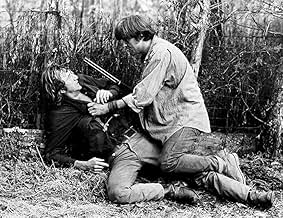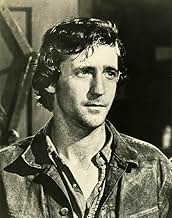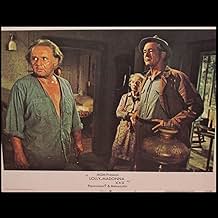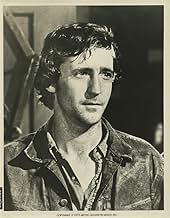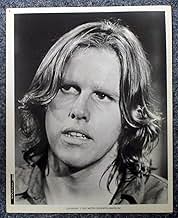VALUTAZIONE IMDb
6,4/10
948
LA TUA VALUTAZIONE
Aggiungi una trama nella tua linguaIn the early 1970s, a young woman passing through rural Tennessee unintentionally gets caught in a feud between two local neighboring clans, the Feathers and the Gutshalls.In the early 1970s, a young woman passing through rural Tennessee unintentionally gets caught in a feud between two local neighboring clans, the Feathers and the Gutshalls.In the early 1970s, a young woman passing through rural Tennessee unintentionally gets caught in a feud between two local neighboring clans, the Feathers and the Gutshalls.
- Regia
- Sceneggiatura
- Star
Kathy Watts
- Lyda Jo Gutshall Feather
- (non citato nei titoli originali)
Recensioni in evidenza
Like a number of movies from Metro-Goldwyn-Mayer that were made in the first half of the 1970s, "Lolly-Madonna XXX" was hard to see for many years until quite recently. I'd always been curious about it, so when it popped up on Turner Classic Movies one night, I was sure to record it and subsequently watch it. After seeing it, I think I can understand why the movie was held back for so long. As I said in my summary line, the movie is not awful. It is well acted, both by established stars Steiger and Ryan, as well as by the members of the cast who hadn't become stars yet. The movie feels authentic; you really get a taste of what run down and poverty-stricken life the characters live. However, there is one big flaw that sinks the movie, and that is that it's extremely slow. Scene after scene goes by with no real consequence - even the ending feels incomplete. If there had been more real plot, we might have had something here. But as it is, the movie will probably only appeal to film buffs with interest in the cast as well as with major studio movies that are obscure.
This is not a great film, by any means, but they make an honest effort to build up the ridiculous notion of territorial ownership of people, fences, and honor. Robert Ryan (wonderful actor since the 40's) and Rod Steiger (more restrained than usual) are the patriarchs of two rural hillbilly families with an innocent girl standing between them.
Jeff Bridges, Scott Wilson, Gary Busey, and Randy Quaid are some of their brood that puts this slightly above the usual drive-in fare. Kiel Martin is very good. Nice cinematography and none of the cast is coasting, it just never really catches fire. Worth a watch, though. Best performance = Scott Wilson. A 6 out of 10.
Jeff Bridges, Scott Wilson, Gary Busey, and Randy Quaid are some of their brood that puts this slightly above the usual drive-in fare. Kiel Martin is very good. Nice cinematography and none of the cast is coasting, it just never really catches fire. Worth a watch, though. Best performance = Scott Wilson. A 6 out of 10.
This viewer had been wanting to see this little movie for years. Not only does it have a strong cast of veterans and then up-and-coming young stars, but it sounded like fun. He expected something trashy and action-driven, but ended up getting something more. This is really a pretty thoughtful melodrama with very convincing rustic atmosphere and efficient direction by Richard C. Sarafian (of "Vanishing Point" fame).
Rod Steiger and Robert Ryan (the latter in one of his final film roles) play Laban and Pap, the patriarchs of the Feather and Gutshall families. These families used to be close, but eventually things got bad, real bad. The Hatfields and McCoys type feud starts out somewhat mild, with pranks being pulled. The title comes from a phony postcard, signed by a made-up woman, "Lolly-Madonna", designed to get one family to abandon their still. This leads the Feathers to kidnap a young traveller (Season Hubley) who they are convinced must be this "Lolly- Madonna".
It's interesting to note that this was an early credit for the famed author Sue Grafton, who also wrote the screenplay with producer Rodney Carr-Smith. It's a very serious meditation on the utter futility and madness of any war, especially the Vietnam war. The material gives some juicy acting opportunities to a superb ensemble. Steiger and Ryan mostly play it low key (although Steiger *does* eventually erupt into typical Steiger-esque acting) in order to let the younger generation make their mark. And what a supporting cast: Jeff Bridges, Scott Wilson, Timothy Scott, Kiel Martin, Ed Lauter, Randy Quaid, Gary Busey, Paul Koslo. Lauter is especially fun as Hawk, who has fantasies of being an Elvis-like rock star. Bridges plays Labans' son Zack, and as he and Hubley make a connection, you realize that they're the biggest hope for some semblance of sanity and reason in this story. Still, it's hard to deny the somber feeling of inevitability to everything here.
The rough, grainy look is actually appropriate for the mood, and Fred Myrow contributes a very affecting music score.
This is an intriguing, now somewhat obscure, movie deserving of another look.
Eight out of 10.
Rod Steiger and Robert Ryan (the latter in one of his final film roles) play Laban and Pap, the patriarchs of the Feather and Gutshall families. These families used to be close, but eventually things got bad, real bad. The Hatfields and McCoys type feud starts out somewhat mild, with pranks being pulled. The title comes from a phony postcard, signed by a made-up woman, "Lolly-Madonna", designed to get one family to abandon their still. This leads the Feathers to kidnap a young traveller (Season Hubley) who they are convinced must be this "Lolly- Madonna".
It's interesting to note that this was an early credit for the famed author Sue Grafton, who also wrote the screenplay with producer Rodney Carr-Smith. It's a very serious meditation on the utter futility and madness of any war, especially the Vietnam war. The material gives some juicy acting opportunities to a superb ensemble. Steiger and Ryan mostly play it low key (although Steiger *does* eventually erupt into typical Steiger-esque acting) in order to let the younger generation make their mark. And what a supporting cast: Jeff Bridges, Scott Wilson, Timothy Scott, Kiel Martin, Ed Lauter, Randy Quaid, Gary Busey, Paul Koslo. Lauter is especially fun as Hawk, who has fantasies of being an Elvis-like rock star. Bridges plays Labans' son Zack, and as he and Hubley make a connection, you realize that they're the biggest hope for some semblance of sanity and reason in this story. Still, it's hard to deny the somber feeling of inevitability to everything here.
The rough, grainy look is actually appropriate for the mood, and Fred Myrow contributes a very affecting music score.
This is an intriguing, now somewhat obscure, movie deserving of another look.
Eight out of 10.
This one starts out like the distant inbred cousin of Deliverance from West Virginia come out on the porch to play the banjo. A menacing beat-up flatbet truck runs circles around a girl killing time in a remote bus stop on her way to Nashville. There's promise of backwoods squalor and meanness and the delivery of it, not exploitation graphic and gratuitous but it's there, the passerby girl is snatched, another girl is raped, a moonshine still is busted, and a backwoods yokel with painted eyes and a bra makes a scene. At that point the Feathers family appears to be only a few generations of inbreeding away from moving down to Texas to make lampshades out of human skin and chase Marilyn Burns with a buzzing chainsaw.
Then, as the two feuding families headed by patriarchs Rod Steiger and Robert Ryan begin to spar about stolen hogs and a postcard written to one Lolly-Madonna and a grassy meadow that at one time belonged to one or the other family, something begins to change like a dark cloud passes over the movie. It's not about the futile anguish and madness of vendetta, although it seems so at first. And it's not about hogs or the grassy meadow or even land as a basic abstraction and what it's come to signify for people who had nothing to call their own for generations but land. It's about the creeping realization of a broken life muttering to itself late at night on a rocking chair by the window that "it's too late", that it's too late not for killing and dying but for even words.
It's about something that happened long ago which can't be made right again, and it has something to do with a son who never came back from the war, about brothers who can never measure up to that son who never came back from the war because they stayed behind, about a dead wife who was more important to the father-in-law than the son who lost her, that much more important that the father-in-law had to sacrifice that which was the most important thing in the life of the other son (the one who never amounted much for anything) to repudiate the killing. And about horses. It's about bitter regret pain and anguish gnawing at the insides and then the grassy meadow is set on fire and the two families meet for a standoff outside the old rundown Feathers home, once probably elegant with wealth happiness and good fortune.
In the end, the look on Rod Steiger's eyes turns from anger and sadness to complete madness and Sarafian gives us freeze frames of the main characters that look like portraits of despair, the colors are drained out and the movie turns sepia yellowish as if in memory of something lost, of that small insubstantial detail that involved horses and the dead wife that was the result not of practical design or coincidence but of the pure blind chance of the cointoss that forever changed the lives of two families. Immense sadness. Or like William Faulkner would say, between grief and nothing, Lolly-Madonna XXX will choose grief.
Then, as the two feuding families headed by patriarchs Rod Steiger and Robert Ryan begin to spar about stolen hogs and a postcard written to one Lolly-Madonna and a grassy meadow that at one time belonged to one or the other family, something begins to change like a dark cloud passes over the movie. It's not about the futile anguish and madness of vendetta, although it seems so at first. And it's not about hogs or the grassy meadow or even land as a basic abstraction and what it's come to signify for people who had nothing to call their own for generations but land. It's about the creeping realization of a broken life muttering to itself late at night on a rocking chair by the window that "it's too late", that it's too late not for killing and dying but for even words.
It's about something that happened long ago which can't be made right again, and it has something to do with a son who never came back from the war, about brothers who can never measure up to that son who never came back from the war because they stayed behind, about a dead wife who was more important to the father-in-law than the son who lost her, that much more important that the father-in-law had to sacrifice that which was the most important thing in the life of the other son (the one who never amounted much for anything) to repudiate the killing. And about horses. It's about bitter regret pain and anguish gnawing at the insides and then the grassy meadow is set on fire and the two families meet for a standoff outside the old rundown Feathers home, once probably elegant with wealth happiness and good fortune.
In the end, the look on Rod Steiger's eyes turns from anger and sadness to complete madness and Sarafian gives us freeze frames of the main characters that look like portraits of despair, the colors are drained out and the movie turns sepia yellowish as if in memory of something lost, of that small insubstantial detail that involved horses and the dead wife that was the result not of practical design or coincidence but of the pure blind chance of the cointoss that forever changed the lives of two families. Immense sadness. Or like William Faulkner would say, between grief and nothing, Lolly-Madonna XXX will choose grief.
I saw this movie when I was a boy and it had an indelible effect on me. I am 41 years old and I still remember how its simple folk and their seemingly insurmountable problem touched me. Like another reviewer I also recall the score as being perfect. See this movie if you can. I am only sorry it is not available on VHS or DVD. I would surely buy it.
Lo sapevi?
- QuizBased on the 1969 novel, "The Lolly Madonna War," by Sue Grafton, author of the popular "alphabet mysteries" featuring hard-boiled female Private Investigator Kinsey Millhone. The twelfth installment, "'L' is for Lawless," was published in the United States in 1995.
- Citazioni
Sister E. Gutshall: [to Hawk's made-up face] Indian chief my foot! You look like a shitty little queer!
- Versioni alternativeThe film originally received an "R" rating from the MPAA due to the violence, which was later trimmed to receive a "PG" rating. The details removed from the "R" version include a brief Season Hubley nude scene, and "toning down" of the violence, especially the scene in which "Laban" kicks "Thrush" to death. Most critics saw the "R" version.
- ConnessioniFeatured in The Moviemakers (1973)
I più visti
Accedi per valutare e creare un elenco di titoli salvati per ottenere consigli personalizzati
- How long is Lolly-Madonna XXX?Powered by Alexa
Dettagli
Contribuisci a questa pagina
Suggerisci una modifica o aggiungi i contenuti mancanti

Divario superiore
What is the French language plot outline for La terra si tinse di rosso (1973)?
Rispondi

